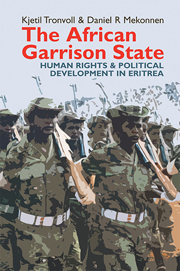Book contents
- Frontmatter
- Contents
- List of Acronyms and Abbreviations
- Preface
- Map 1 Provinces, Main Towns and Ethno-linguistic Groups of Eritrea
- 1 Introduction: The Eritrean Garrison State
- 2 Judicial Development in Independent Eritrea: Legal Pluralism and Political Containment
- 3 Rule of Law(lessness): The Special Court and the Judiciary
- 4 Democratic Curtailment: ‘Never Democracy, Always Control!’
- 5 Obliterating Civil Society: Denying Freedom of Organisation and Expression
- 6 The Eritrean Gulag Archipelago: Prison Conditions, Torture and Extrajudicial Killings
- 7 Everyday Life of Detention and Disappearances: Vulnerable Groups in a Population Under Siege
- 8 Minority Marginalisation: EPLF's Policies of ‘Cultural Superiority’
- 9 Diversity Diminished: Targeting the Kunama Minority Group
- 10 The Militarisation of Eritrean Society: Omnipresent and Never-Ending Military Service
- 11 Eritrea: Towards a Transition?
- Bibliography
- Index
5 - Obliterating Civil Society: Denying Freedom of Organisation and Expression
Published online by Cambridge University Press: 05 October 2014
- Frontmatter
- Contents
- List of Acronyms and Abbreviations
- Preface
- Map 1 Provinces, Main Towns and Ethno-linguistic Groups of Eritrea
- 1 Introduction: The Eritrean Garrison State
- 2 Judicial Development in Independent Eritrea: Legal Pluralism and Political Containment
- 3 Rule of Law(lessness): The Special Court and the Judiciary
- 4 Democratic Curtailment: ‘Never Democracy, Always Control!’
- 5 Obliterating Civil Society: Denying Freedom of Organisation and Expression
- 6 The Eritrean Gulag Archipelago: Prison Conditions, Torture and Extrajudicial Killings
- 7 Everyday Life of Detention and Disappearances: Vulnerable Groups in a Population Under Siege
- 8 Minority Marginalisation: EPLF's Policies of ‘Cultural Superiority’
- 9 Diversity Diminished: Targeting the Kunama Minority Group
- 10 The Militarisation of Eritrean Society: Omnipresent and Never-Ending Military Service
- 11 Eritrea: Towards a Transition?
- Bibliography
- Index
Summary
INTRODUCTION
When Eritrea achieved independence, de facto 1991 and de jure 1993, many national and international observers expressed a strong degree of optimism towards a positive development of democracy, civil society and a culture of human rights in the country. President Isaias Afwerki was characterised as belonging to the ‘new breed’ of African leaders who apparently enjoyed popular support among their constituencies, rhetorically endorsed liberal democracy, human rights and a free market economy, and had a well-defined development policy based on their own priorities. As such, Isaias Afwerki, and the rest of his generation of leaders, heralded a clear breach with the ancien regime of Mengistu Haile-Mariam.
Today, however, Eritrea is characterised as one of the world's worst dictatorships, where human rights are violated on a massive and systematic scale. Institutions of democracy and civil society – which ought to function as checks and balances to unaccountable political power – plainly do not exist in the country. As this study illustrates, the seeds of dictatorship were sown early in Eritrea (Kibreab 2008); whereas the final blow to democratic development was experienced in the aftermath of the 1998-2000 Eritrean-Ethiopian war.
OPPOSING THE EMERGING ONE-MAN DICTATORSHIP: POST-WAR REFORM MOVEMENT
Eritrean-Ethiopian relations gradually deteriorated after Eritrean independence, as the two formerly friendly resistance movements held different perceptions about how to organise state and governance, and opted for varying strategies of ‘development’ (Negash and Tronvoll 2000).
- Type
- Chapter
- Information
- The African Garrison StateHuman Rights and Political Development in Eritrea, pp. 75 - 91Publisher: Boydell & BrewerPrint publication year: 2014



